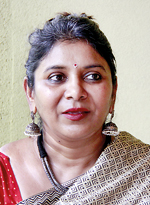A special bond with SOS Sri Lanka
In 1949, on seeing the pain and suffering of young children orphaned by World War II, Hermann Gmeiner was moved. A child welfare worker in Austria, Gmeiner committed himself to giving those children a loving family and a supportive community to grow up in, founding the first SOS Children’s Village in Austria. Almost 70 years later the organisation has spread over 118 countries, with over 500 villages.

Shubha Murthi
The suffering Gmeiner saw back then still affects millions of children worldwide. Children are the most vulnerable in any society and when tragedy hits, be it war or natural disasters, they’re likely to be disproportionately affected. “Every child needs a family. So that one day he or she can find their own place in society,” says Shubha Murthi, the international director for the Asia Region of SOS Children’s Village International who was in Sri Lanka recently.
Sri Lanka is very special to us, she says, explaining how the organisation was first established in the 1980s in the island, on the invitation of the then Director of the Children’s Secretariat Malsirini Dias.
Those on the international board have at various points in time been personally involved in the efforts in Sri Lanka. Current president of SOS Children’s Village International, Siddarth Kaul, oversaw the relief programmes in India and Sri Lanka after the 2004 tsunami, where over 7000 homes were built on the eastern and southern coastlines.
For Shuba Murthi herself, having first visited the country in 1994 during the height of the war, seeing the country move forward to peace and reconciliation has been an uplifting experience. One such defining moment for her, was the reunification of over 270 children displaced during the war with their parents after it ended. A process which was long and arduous, but ultimately satisfying she says.
But the work of SOS Children’s Village isn’t confined to relief programmes alone. For 40 years the organisation has been providing orphaned, abandoned, or underprivileged children a loving home. The Villages function as an alternative to the state run orphanages and a child is placed under the care of a foster mother, with each ‘mother’ having between 8 and 10 children under her care, until her retirement. The first of these Villages was established in Piliyandala in 1981 and since then five other villages have been established in Nuwara Eliya, Galle, Anuradhapura, Moneragala and Jaffna. Currently they house over a thousand children, and it’s estimated that over 41,000 children have passed through the system.
A large part of the organisation’s work includes financing state run homes which are heavily underfunded. According to Ananda Karunarathne, the National Director for SOS Children’s Village in Sri Lanka the state provides a mere Rs. 50 per day for a child, with it being as low as Rs. 30 in some provinces.
In addition, the organisation also works with families in the villages of Peraliya and Gandara in Galle, to strengthen their capacity to care for and protect their children. “It’s an empowerment system,” says Ms. Murthi. “We teach them to save. We help enhance their businesses and establish community based organizations to facilitate this.
Though focused primarily on the care of children, SOS does provide facilities for the development and upliftment of young adults as well, mainly through their vocational training facilities in Anuradhapura, Moneragala and Jaffna. The project which has seen over 1500 students pass through has been a resounding success, with an over 98% graduate employment rate.
Such programmes are especially important in today’s economic climate explains Ms. Murthi, as the youth population in the Asian region is rapidly expanding.
In Sri Lanka the organisation has advocated against the practice of separating siblings in the adoption process, which causes further psychological turmoil to children already in a vulnerable state. Though laws banning the practice have yet to be enacted, their efforts have led to courts in the Western Province following the ‘best interest of the child’ policy and ruling against separation of siblings during adoption.
In its four-decade history SOS Children’s Village has had a significant effect on the lives of children and their families in this country, with thousands of people benefiting from its work. The organisation has been able to do so through funding and support it received from international donors. But now, with the war behind it, Sri Lanka is classified as middle income country. What this means according to the National Director, is that island now has the capacity to support the work of the organization.
“It’s time to give back,” says Karunarathne, as he urges people to contribute on a regular basis. “A child can’t eat or go to school only for a month.”
For more information, please contact SOS on 0112702712 or see www.soschildrensvillages.lk


